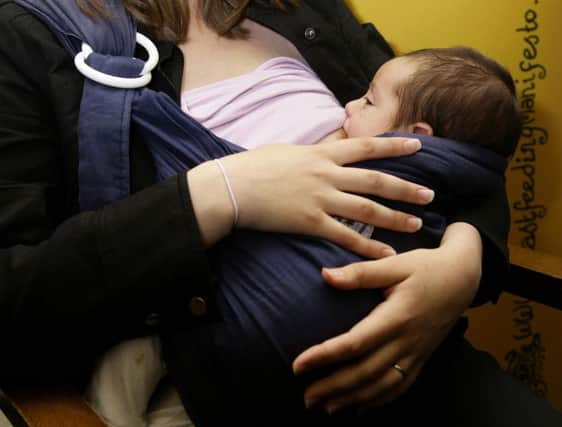Success for campaign to get mothers to breastfeed


Mothers with few or no educational qualifications who gave birth in 2011 were far more likely to breastfeed for longer than similar mothers in 2005, according to research.
The University of Edinburgh study showed that among these women breastfeeding for six months or more, there was a 150 per cent higher chance of mothers breastfeeding for longer in 2011 compared with 2005.
Advertisement
Hide AdAdvertisement
Hide AdThere was no similar improvement for more socially advantaged women, although these mothers already breastfed for longer, the researchers said.
Breastfeeding is recommended due to health benefits for mothers and babies. For women, they include a reduced risk of breast and ovarian cancer.
Breastfed babies have a lower chance of suffering diarrhoea and vomiting, have fewer chest and ear infections, are less likely to become obese and develop type 2 diabetes and other illnesses in later life, and have less chance of developing eczema.
But despite advice, many women who start to breastfeed stop after a short time and others do not attempt it at all.
Dr Valeria Skafida, of the Centre for Research on Families and Relationships at the University of Edinburgh, said policies supporting breastfeeding which had been introduced in Scotland during the last ten years may have contributed to the rise in disadvantaged mothers deciding to breastfeed. This has included greater support for new mothers in hospital to encourage breastfeeding as well as help after they go home from health visitors and other staff.
The study, published in the European Journal of Public Health, drew on national surveys of more than 5,000 mothers in 2005 and almost 6,000 in 2011, and assessed breastfeeding habits of mothers in the first ten months of their babies’ lives.
Mothers who gave birth in 2011 were 25 per cent more likely to give up breastfeeding in the first month compared with mothers in 2005. Researchers said this may be because a larger proportion of mothers breastfed in 2011 compared with 2005.
Mothers in households where a language other than English was spoken were four times more likely to breastfeed compared with those from homes where only English was spoken.
Advertisement
Hide AdAdvertisement
Hide AdDespite the study’s findings, the most recent figures on breastfeeding rates in Scotland, covering 2012-13, show overall levels have been static for several years.
Health minister Michael Matheson said he was encouraged by the new study’s findings.
“It is particularly pleasing to see a rise in the number of mothers from disadvantaged backgrounds who have breastfed for longer,” he said.
“This is good news as there is considerable evidence to demonstrate that children who are breastfed lead healthier lives and are less likely to access NHS services in later life.”